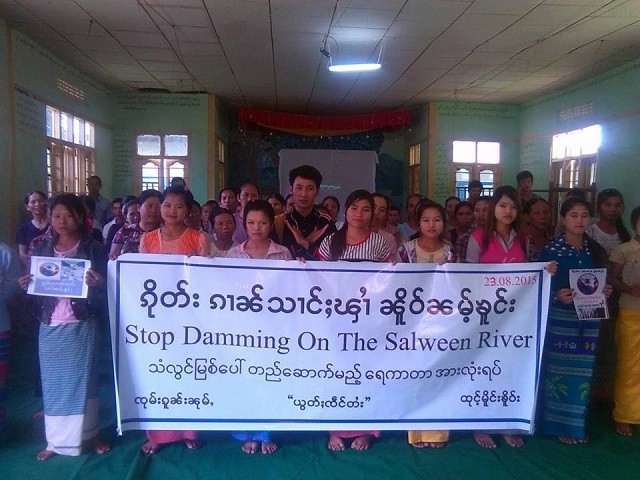Twenty-six Shan-based organizations on Wednesday sent an open letter to Burma’s State Counselor and Foreign Minister Aung San Suu Kyi, calling on her government to put an immediate halt to hydroelectric dam projects on the Salween River.

The letter coincided with Suu Kyi leaving to undertake a five-day trip to China, where she is scheduled to discuss Burma’s peace process, as well as the controversial hydropower projects that Beijing is looking to finance.
On August 12, the Burmese government, which is led by Suu Kyi’s National League for Democracy, announced that the hydropower projects on the Salween River will be continued as the country is in need of energy.
Sai Khur Hseng, a representative from the Shan Sapawa Environmental Organization and spokesperson for Wednesday’s joint-statement, said that he is worried about the construction of the dams.
“If the dams are built, more government troop reinforcements will be brought in to secure those areas,” he said. [The sites for these hydropower dams are in areas controlled by ethnic armed groups.] Therefore, the dams will cause increased fighting.”
“Now is not the right time for this type of construction,” Sai Khur Hseng continued. “The country is currently about to embark on a programme of political dialogue [between the government, military, and ethnic groups]. Therefore the dam projects must be stopped.”
According to a statement on August 8 from the State Counselor’s Office, the peace talks – dubbed the “21st Century Panglong Conference” – are scheduled to begin in Naypyidaw on August 31. The conference will see some 700 representatives from the military, government, parliament, political parties, and ethnic groups sitting for discussions on the nature of future peace talks.
“[Giving the] green light to the Salween dams is highly worrying,” the statement said.
The 3,000-kilometre Salween River, officially known in Burmese as the Thanlwin, is listed as the 25th longest waterway in the world, beginning in the Tibetan plateau, passing through southern China, Burma and the Thai border, before draining in the Andaman Sea.
Unlike the Irrawaddy River, which supports bustling cargo and industry sectors in central Burma, the Salween mostly runs through isolated mountainous and forested areas. It is said to be one of the most diverse eco-regions in the world, and supports up to 140 species of fish, 7,000 species of plants, and between 10 and 15 species of turtle.
The blueprints for a hydropower project on the Salween include a series of dams in Shan State: the 7,100 megawatt Mong Ton Dam; the 1,400 MW Kunlong Dam; the 1,200 MW Nong Pha Dam; and the 200 MW Manntaung Dam. The project would also include plans for a 4,000 MW Ywathit Dam in Karenni State, and the 1,360 MW Hat Gyi Dam in Karen State. Investors in the projects include the China Three Gorges Corporation, a Chinese state-owned firm which operates the world’s largest dam on the Yangtze River. The other foreign firms involved in the Salween project are: Sinohydro; China Southern Grid; and a subsidiary of the state-run Electricity Generating Authority of Thailand.
Local partners are the Burmese Ministry of Electric Power and the International Group of Entrepreneurs (IGE), a firm controlled by the offspring of the late Aung Thaung, the long-time industry minister under Snr-Gen Than Shwe’s military regime.
According to the related contracts, when the projects are completed, 90 percent of the electricity generated is to be exported to China and Thailand.
Environmentalist Sai Khur Hseng added that the planned dam projects are in active earthquake areas.
“Yesterday, there was an earthquake on the Nam Ting river [near the site of Kun Long Dam],” he said. “If this dam is built, the people who live along the river in Tanyan Township will be heavily impacted.”
According to the August 17 statement by the Shan CBOs: “The Salween River is a vital artery for millions of ethnic people in eastern Burma, Thailand and China, who will be irreparably impacted by blockage of its mighty flow. There has been consistent opposition to the Salween dams by communities in Shan, Karenni, Karen and Mon states, as well as other parts of Burma and neighbouring countries.”
On August 10, Shan Herald reported that residents of Nong Pha had staged a protest demanding the halt of the dam construction on the Nong Pha River.
Nang Kham Mai, an environmental activist who signed yesterday’s statement, said that she has urged the government to consider the consequences of the project on the local people and the country.
“There are so many impacts,” she explained. “People who live alongside the river will lose their homes and livelihoods, and historical properties will also be damaged.
“In the interests of ethnic reconciliation and environmental sustainability, we therefore strongly urge you [State Counselor Aung San Suu Kyi] to immediately cancel the Salween dams. Only federal policies granting equal rights to the ethnic peoples will end the civil war in Burma, a goal which our neighbouring countries will also wholeheartedly support,” reads the statement.
The 26 groups singing yesterday’s statement were: Action for Shan State Rivers; Shan State Farmers’ Network; Shan Farmers’ Network; Shan Sapawa Environmental Organization; Shan Human Rights Foundation; Shan Women’s Action Network; Shan Students Union-Thailand; Shan Youth Power; Shan Youth Organization (Taunggyi); Shan Youth Network Group; Kaw Dai; Workers’ Solidarity Association; Zao Khur Tai; Nong Zarng Customary Land Committee; Toom Toan Tai; Shan Relief and Development Committee; Community Action for Development Education (Shan State); Mong Pan Youth Committee; Kong Jor Refugee Camp Committee; Wan Paing Fah IDPs Camp Committee; Laikha Youth Association; Capacity Building for Youth (Laikha); Shan State Women’s Organisation; Shan State Youth Network Committee; Tai Literature and Culture Association (Karli); and the Tai Youth Organization (Karli).
By Shan Herald Agency for News (SHAN)











Leave a Comments